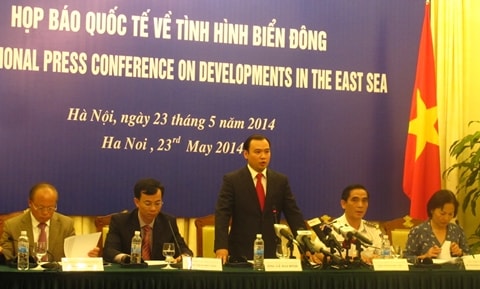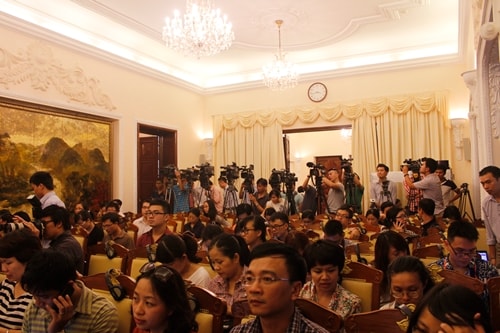Territorial sovereignty is sacred and cannot be exchanged for anything.
On the afternoon of May 23, in Hanoi, the Ministry of Foreign Affairs held an international press conference on the situation in the East Sea, announcing the latest developments related to China's unilateral illegal placement of the Haiyang Shiyou 981 drilling rig in Vietnam's exclusive economic zone and continental shelf.
 |
| Mr. Le Hai Binh, spokesman of the Ministry of Foreign Affairs, announced the reason for the international press conference. |
Chairing and answering questions at the press conference were Mr. Tran Duy Hai, Deputy Head of the National Border Committee - Ministry of Foreign Affairs; Do Van Hau, General Director of the Vietnam National Oil and Gas Group; Ngo Ngoc Thu, Deputy Commander of the General Staff, Vietnam Coast Guard Command; Le Hai Binh, Spokesperson of the Ministry of Foreign Affairs and Ms. Nguyen Thi Thanh Ha, Director of the Department of International Law.
At the beginning of the press conference, Mr. Tran Duy Hai refuted China's recent false arguments regarding Vietnam's sovereignty over the Hoang Sa archipelago; at the same time, he presented legal grounds and historical evidence affirming Vietnam's sovereignty over the Hoang Sa archipelago.
 |
| Many domestic and international reporters attended the press conference. |
Next, Mr. Do Van Hau, General Director of Vietnam National Oil and Gas Group, presented the legal oil and gas exploitation process in Vietnam. Mr. Hau affirmed that Vietnam National Oil and Gas Group was assigned by the Vietnamese Government to manage and implement oil and gas exploitation activities throughout the entire territory and territorial waters of Vietnam. All oil and gas activities of the Corporation and its partners are carried out within the framework and limits of Vietnam's exclusive economic zone.
In the Q&A session with the press, Mr. Tran Duy Hai once again affirmed that the 1958 Letter of Prime Minister Pham Van Dong is a diplomatic document, with legal value on the issues stated in the Letter, that Vietnam respects the 12 nautical miles declared by China. The Letter does not mention territorial sovereignty, the issue of Hoang Sa and Truong Sa, so it has no legal value on the sovereignty of the two archipelagos of Truong Sa and Hoang Sa.
“The value of the Diplomatic Note must be placed in a specific context. At that time, Hoang Sa and Truong Sa were under the administration of the Republic of Vietnam according to the Geneva Agreement of 1954. According to common logic, you cannot give others something that you do not have. Therefore, the Diplomatic Note has no value in China's recognition of the so-called Nam Sa or Tay Sa (as China calls them) – Mr. Hai affirmed.
Responding to the question of whether Vietnam has taken advantage of international support and how it has prepared for this option, Ms. Nguyen Thi Thanh Ha, Director of the Department of International Law, affirmed: Vietnam has the right to use all dispute resolution mechanisms stipulated in the UN Charter as well as the 1982 Convention on the Law of the Sea to resolve issues related to itself. The use of peaceful solutions, including the possibility of using international judicial bodies. And this is in accordance with international law. The use of legal measures is better than the occurrence of armed conflicts.
Next, Mr. Tran Duy Hai rejected the arguments from China, once again affirming that the position of the Haiyang-981 drilling rig is completely within Vietnam's exclusive economic zone and continental shelf. "Tri Ton in the Hoang Sa archipelago is actually a rock. No matter what, there cannot be a sea area exceeding 12 nautical miles. The Haiyang-981 drilling rig is operating 17 nautical miles from Tri Ton, it cannot belong to the Hoang Sa archipelago. And even if that area belongs to Hoang Sa, it is still under Vietnam's sovereignty" - Mr. Hai said.
Mr. Le Hai Binh also expressed a strong opinion: "No matter how it is determined, the area where China unilaterally and illegally placed the Haiyang Shiyou-981 drilling rig is completely within Vietnam's waters according to the provisions of the 1982 United Nations Convention on the Law of the Sea."
“Independence and freedom are more precious than gold”
Answering the press's question about Prime Minister Nguyen Tan Dung's statement on May 21 in Manila, Philippines, affirming that Vietnam would never accept trading sovereignty, territorial integrity, and maritime zones for an illusory peace and friendship, has Vietnam's patience reached its limit? Mr. Tran Duy Hai replied: "Territorial sovereignty is extremely sacred to the Vietnamese people and cannot be exchanged for anything. Independence and freedom are more precious than gold."
Mr. Hai also affirmed that the current exchange and trade activities at the Vietnam-China border are still taking place normally. During the meeting between the two Deputy Foreign Ministers of the two countries, the two sides agreed not to use military measures to resolve the disagreement.
A reporter from a German news agency asked to verify the information about 4 Chinese people who died in clashes that occurred in the Central region. Mr. Le Hai Binh gave official information from the Vietnamese authorities that in the riots in Ha Tinh, 2 Chinese people died. And in Binh Duong, only one Chinese person died unexpectedly.
“The recent disturbances in some localities in Vietnam are extremely regrettable. Up to now, under the close direction of Prime Minister Nguyen Tan Dung, social order and safety in the localities have stabilized and returned to normal. Foreign enterprises have all resumed production activities. Except for some Chinese enterprises, no enterprise has withdrawn its workers from Vietnam,” Mr. Hai added.
“China announced the suspension of some exchange and relationship activities with Vietnam. What are those activities and what impact will they have on Vietnam’s economy?” – Responding to this question from a reporter from a Japanese news agency, Mr. Hai affirmed that, up to now, all exchange activities between the two countries have not stopped. The workers sent back to the country are unskilled workers. Enterprises all have alternative plans so production activities will not be affected.
China used up to 137 ships to protect Haiyang Shiyou-981.
Responding at the press conference, Mr. Ngo Ngoc Thu, Deputy Commander, Chief of Staff, Vietnam Coast Guard Command, said that the Chinese Foreign Ministry's press conference accusing Vietnam of provocation and using ships operating at sea to ram ships protecting the Haiyang Shiyou-981 drilling rig was extremely false and slanderous information.
“We reject this information because in fact, on the peak day of May 20, China used up to 137 ships to protect the drilling rig, including 4 warships and aircraft. China's activities in this area include using high-powered water cannons, using generators to create sounds and sound waves that cause discomfort to the surrounding area of about 100 meters; using high-powered headlights and other means to impact Vietnamese ships; using measures to ram and obstruct Vietnamese ships at sea.
Regarding warships, China has 5 types: amphibious transport ships with 8 anti-aircraft missile launchers and 16mm gun mounts; missile frigates; fast attack missile patrol boats; anti-submarine patrol boats and missile destroyers.
Meanwhile, Vietnam did not use any tools on board to respond; did not use water cannons or water cannons, but only used propaganda tools, demanding that China stop its illegal encroachment of the sea and withdraw the drilling rig from Vietnam's waters. Vietnamese coast guard and fisheries surveillance ships were rammed about 20 times. Vietnam deployed a limited number of law enforcement vessels of the coast guard and fisheries surveillance, and there were no warships in the area. Vietnamese and foreign reporters present at the scene can confirm the accuracy of the information China provided.
According to Hanoi Moi Online






